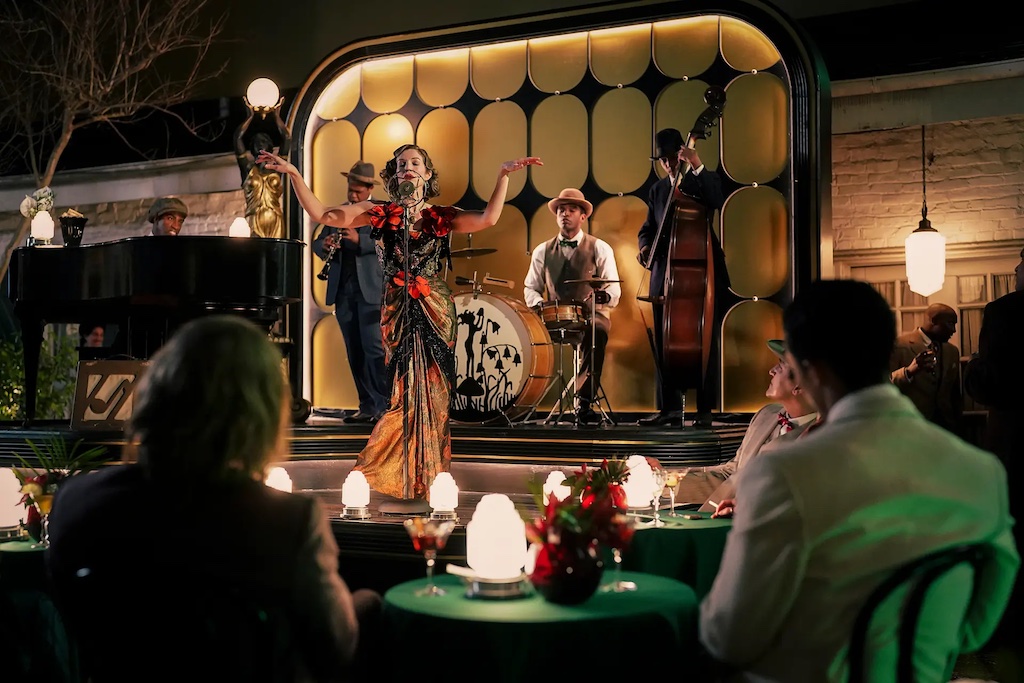
They say music is a universal language. For composer Daniel Hart (The Green Knight), the notes and melodies he creates through a string quartet or a violin concerto communicate stories that are rich with emotion. The classically trained violinist from Lake Highlands, Texas, speaks musically and thematically for the vampiric characters Louis de Pointe du Lac (Jacob Anderson), Claudia (Bailey Bass), and Lestat de Lioncourt (Sam Reid) in Anne Rice’s Interview With The Vampire, evoking a gamut of feelings including love, anger, and lust.
Writing character-driven music stems from Hart’s passion for playwriting, another creative outlet he pursued in college. That talent fell by the wayside when he discovered music and toured as a hired gun, playing and singing for bands such as St. Vincent, Broken Social Scene, Other Lives, and The Polyphonic Spree. Fronting his own bands, Dark Rooms and The Physics of Meaning, he performs his own original songs for audiences across the U.S. and Europe. With composing, you might say Hart is still performing to an extent, albeit for a legion of unseen Anne Rice fans, whom he doesn’t want to disappoint.
Below the Line spoke with Daniel Hart via Zoom video from his home studio in Los Angeles, where he was surrounded by several violins, violas, and a drum kit. He describes the magic of what it was like for a soaring 49-piece orchestra in Vienna to record some of his compositions. Hart was delighted by the numbers of downloads the 18 instrumental tracks have received on various streaming platforms from Milan Records, keeping track of the favorites, especially an original vocal sung by Lestat himself, Sam Reid.
[Note: This interview has been edited for clarity and length]
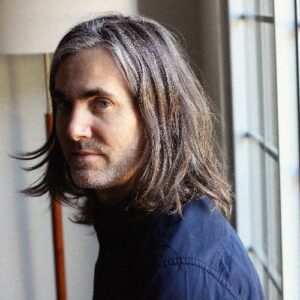
Below The Line: Nice to meet you, and full disclosure I’m a fan of this series! I know you started off in bands and touring, so how’d you transition from writing songs to composing?
Daniel Hart: In 2009, I met this filmmaker, David Lowery, and he was making his first tiny micro-budget film, and he asked me to write some music for it. That led to a slightly bigger film for him that he asked me to write for, and then a bigger one. He just kept asking me, and I kept doing it.
When I was working on Pete’s Dragon, I met with (Anne Rice’s Interview With The Vampire creator) Rolin Jones, who at the time was in charge of a TV show version of The Exorcist, and he asked me to write the music for the first season of that. I did, and then once it came time for Interview with the Vampire, he asked me if I would do this one as well. And here I am.
BTL: That’s quite a journey. What’s it like to go from writing four-minute original songs to two-minute music cues?
Hart: Sometimes it’s tough to be that efficient, to have that little space to say something musically. But whatever this combination is of my classical training and my interest in dialogue and character and motivation stuff from playwriting, and then my interest in all different styles of music, it means that when I watch a scene, if it holds any interest for me at all, then the scene usually speaks to me and tells me what music it needs. Whether it’s one minute long, four minutes long, or longer, it’s a little musical puzzle to solve, and I really enjoy it.
BTL: It seems this was really in your wheelhouse, especially as a playwright and knowing about dialogue and evoking emotion, really played to that.
Hart: [laughs] It’s almost like they made the show for me. It’s almost like AMC asked themselves, “Now, what would Daniel be really interested in doing right now?” Well, writing a bunch of neoclassical music, a bunch of violin solos, working with an orchestra again, writing music for a music box (which debuts in the episode “In Throes of Increasing Wonder’), writing music for New Orleans and Paris, and people who stay up late at night.
BTL: What were your conversations with Rolin about is creating the style of the music of Interview with the Vampire?
Hart: We listened to a lot of music going into the first season together. We listened to a lot of early 20th-century American classical music. We listened to a lot of Florence Price, Aaron Copeland, and William Grant. We listened to a lot of New Orleans-flavored music. We listened to a lot of Louis Armstrong and Duke Ellington. We listened to the score to Mank by Trent Reznor and Atticus Ross, which had some stuff that felt like this world. There’s a waltz in there that was referenced quite a bit.
We wanted to use an orchestra. AMC was kind enough to give us a budget for an orchestra, which doesn’t always happen in TV anymore, so that meant that the palette could be quite wide; we have that many instruments that you can use to express what you’re trying to say.
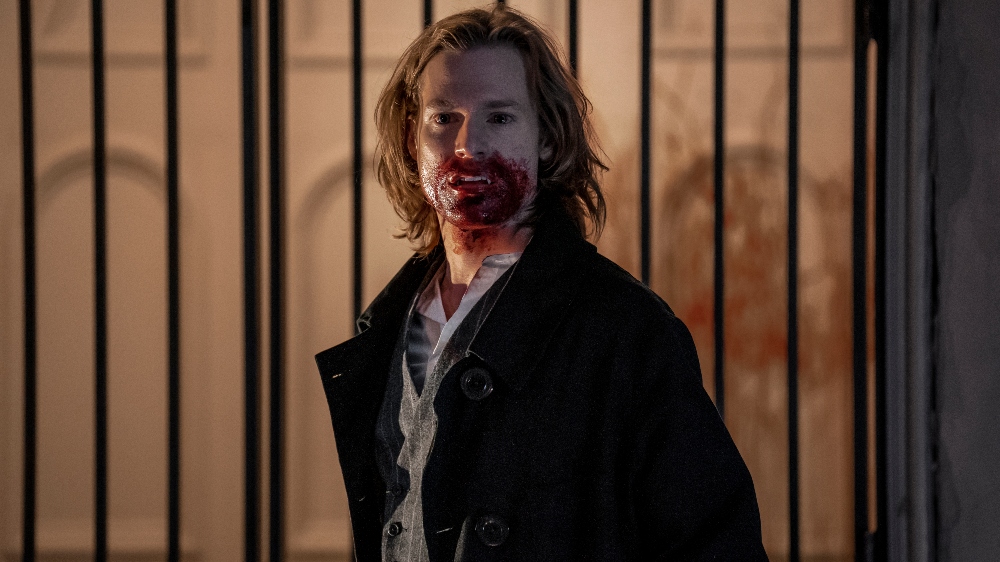
BTL: How many pieces in the orchestra?
Hart: We had a 49-piece orchestra in Vienna. I was with them only remotely. I never went there because they were recording their parts while we were working on music for the season, so there was no time to go over there and come back. But even that was really magical. It was a pretty full string section, with a small wind and brass section, a harp player, and a timpani player.
Any piano stuff I did myself at home, any smaller chamber ensemble stuff because the entire score is not orchestral. There were some more intimate moments that needed something smaller, so that was usually done by me playing string parts at home and friends of mine playing flute and oboe solos.
But the orchestra stuff—the first piece that we recorded on the first day of recording with Vienna was this piece called “Claudia” from episode three when Louis rescues Claudia from the fire, and it’s one of my favorite pieces that I wrote for the whole season. When they started playing it, I got very emotional. I teared up. It was probably good that I wasn’t there in person because I would’ve had to grab some tissues or something.
BTL: What made it so emotional for you?
Hart: There’s a difference between making an orchestral demo on a computer using software and orchestra libraries and then hearing the real thing and the emotion that human players are able to bring into it. It’s a challenge to recreate it fully with software. So, hearing it played with emotion by these players playing this piece that I was really proud of and loved and felt it really served the scene, it doesn’t get better than that. The conductor we had in Vienna is Bernhardt Vossen, and he is one of the best conductors I’ve ever worked with. We really lucked out. I’d never met him before, but he conducted all the sessions for season one, and he was a wizard.
BTL: In crafting these pieces, do you create the type of music that would best resemble each character?
Hart: Every character gets their own theme. Listening to them speak definitely determined the music that they got. The tamber of their voices. If Louis is on screen and he’s speaking, he has a baritone voice. I don’t want to write too much music in that range because the music playing underneath him speaking would compete with his voice. Maybe in that space there wouldn’t be enough for both of those things to happen at the same time. So usually, when Louis is speaking, I want something much higher or lower than where his voice is going. Then Claudia would be the opposite, essentially a really beautiful soprano voice that Bailey had in season one. So a lot of stuff in the mid-range or down low will be good for Bailey.
BTL: Do they each have their own instrument?
Hart: Nicolas de Lenfent, because he’s a violinist and gets a violin whenever he gets referenced. But the others of them, Louis, Lestat, and Claudia, I think each had their own theme, and then that theme was given to different instruments depending on what was needed for the scene.
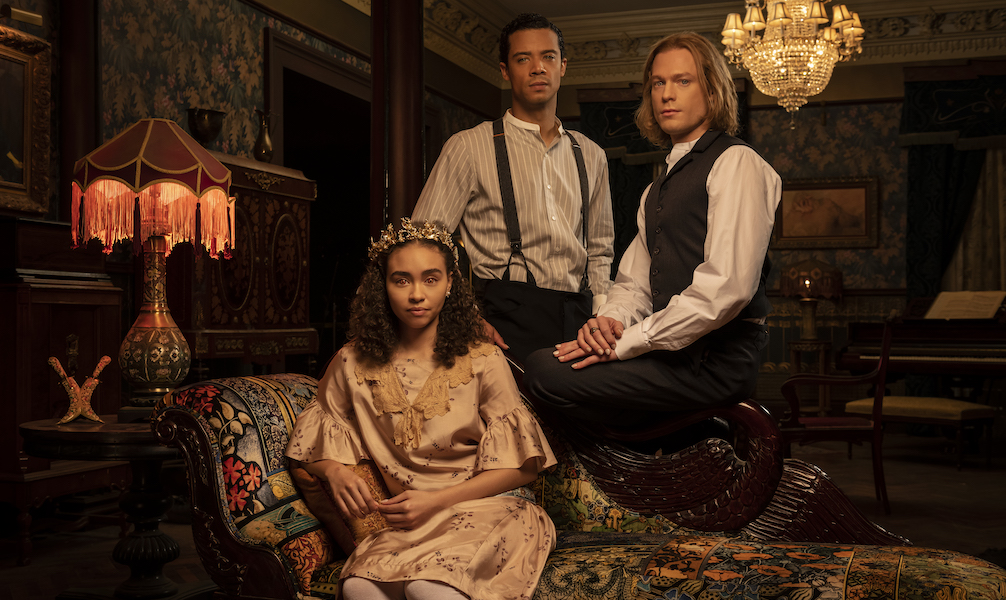
BTL: Can you articulate how you designed the themes for each character?
Hart: Well, Louis is a melancholy man; I would say, overall, he struggles with being a vampire more than the others, so there’s something bittersweet in his theme. There’s a yearning beyond what he’s ever going to have now that he’s who he is, and he’s trying to live by some kind of moral code that it seems like a lot of humans and most other vampires don’t care about. There’s some kind of division; these two things are pulling him apart.
Claudia’s theme is sort of lilting. She was pushed into being a vampire, but when she becomes one, she embraces it and loves it. So there’s this sleekness to it, this swaying melody. Then Lestat is from Paris; he’s from Old World Europe, so it’s a much more traditionally classical thing for him. He has so many rules about how life should be lived and is sort of very uptight and classical, with an undercurrent of violence.
BTL: What were those instruments that would evoke those emotions for each character?
Hart: We put the violence mostly in the brass for Lestat, especially in the first episode in the church when he’s about to turn Louis and he murders these priests. Brass was the only thing powerful enough, big enough, and loud enough to capture the violence of his personality.
Claudia got a lot of strings and wind, but so did Louis. There’s a theme that they have together that’s sort of the sister theme that first starts with Grace (Kalyne Coleman) and Louis, but then it transitions to Claudia and Louis as they become sister and brother, and that was on piano most of the time. The melody was on the piano, and it was actually the same thing for Louis and Paul, his brother. Their theme was also mostly piano. It just felt right for them.
BTL: Do you get inspired by watching the scenes or do you get inspired just knowing what the characters are about or maybe a little bit of both?
Hart: I wrote some music before I had seen any footage, based on conversations with Rolin and the scripts, and I’d say the majority of that stuff we didn’t end up using because everything changes. Once I see the scenes, they tell me everything I need to know about what music they need. All the clues are there. The way the scene is lit, how fast the camera cuts from one shot to the next, and the tone of the actor’s voices, none of that can really come through in the script. All of that stuff informs how fast or slow the music is, how romantic it is, where a theme is needed, or where there shouldn’t be anything because there’s too much dialogue happening to make space for it.
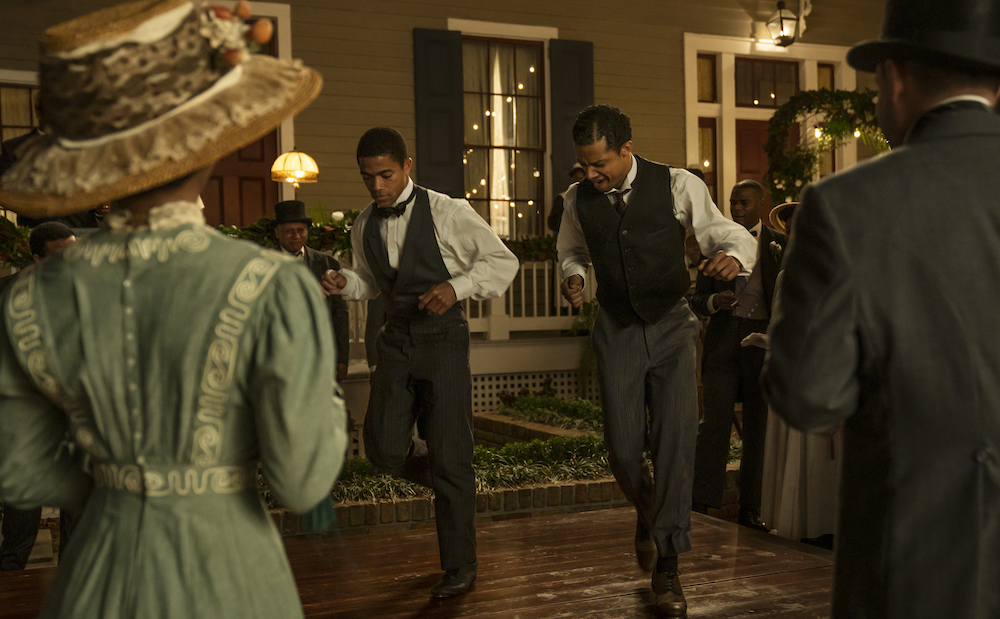
BTL: Based on the terrific fan response to the series, what are some favorite tracks among the show’s audience that maybe have surprised you?
Hart: The music box that plays in Lestat’s apartment in New Orleans, “For a Young Violinist,” is a music box that plays a tune that he supposedly wrote (for his former lover), violinist Nicolas de Lenfent. I wasn’t sure whether to put it on the soundtrack or not because it just makes an appearance in this one scene, and then it’s not talked about again for the rest of the season.
It was also one of my favorite things that I wrote for this season, so I put it on. People really love that one. The fans of the show and the books really love Nicolas and his story, and the fact that he’s a musician himself means that he deserves a lot of music for his character.
There’s a track called “Vicious,” which plays at the end of episode five. It’s the longest piece on the soundtrack, and I wasn’t sure because sometimes people lose interest in things that are longer, but people have listened to that one a lot.
When we recorded the music in Vienna with the orchestra, we also filmed some of it, and we filmed that piece being performed, and we made a little video of it and posted that. I’m really happy with how it all turned out and really glad that we did that because I think seeing the orchestra play adds another level of emotion to experiencing the music. People have also been very complimentary about that video of the orchestra.
BTL: How are you coming along with the music for season two?
Hart: They’re just filming it now, so it’ll be quite a while before I really get to work. Like in season one, there’s some music happening on camera in season two, so I’ve written some stuff already, but no, it’ll be a while before I actually dig into the score for season two.
BTL: What do you want people to experience when they listen to the songs on their own?
Hart: My goal in anything that I work on is to do justice to the story of whatever the project is—to do justice to the story and to the characters. So my hope is that the music will reflect that story and those characters’ journeys as truly as I possibly can. That’s true of any project, but especially for something like Interview with the Vampire, which so many people are already so passionate about because the books resonate so strongly with people and these characters are so beautifully written.
I felt there was an extra pressure to authentically represent something of the inner lives of these characters because music is this intangible thing. It’s out here in the air. It just doesn’t exist in tangible form. And so, that means that music is part of an internal monologue. That’s what I want for this show.
I just want to do it justice in the eyes of the fans and also try not to think about that too much as I’m writing the music and just focus on it, which is hard for me anyway. But yeah, focusing on what’s happening on screen and being true to what I’m seeing is the main thing. If I am true to what I’m seeing on screen and open to the depths of expression that are happening in front of my eyes, then the music will reflect that, and the emotions of the show will be there in the music itself.
Anne Rice’s Interview with the Vampire is available to stream on AMC+.





